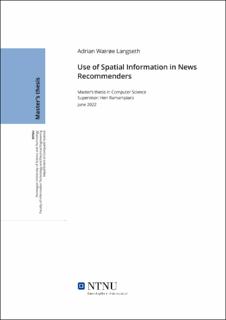| dc.contributor.advisor | Ramampiaro, Heri | |
| dc.contributor.author | Langseth, Adrian Wærøe | |
| dc.date.accessioned | 2022-10-07T17:31:35Z | |
| dc.date.available | 2022-10-07T17:31:35Z | |
| dc.date.issued | 2022 | |
| dc.identifier | no.ntnu:inspera:112046434:33636098 | |
| dc.identifier.uri | https://hdl.handle.net/11250/3024702 | |
| dc.description.abstract | Overgangen fra papiraviser til nyhetsportaler på nett har gjort en enorm mengde nyheter tilgjengelig for brukerne til enhver tid. Dette nødvendiggjør gode nyhetsanbefalingssystemer som kan geleige brukeren gjennom havet av nyhetartikler. I et forsøk på å gi bedre anbefalinger har anbefalingssystemene blitt mer og mer personaliserte. Dette medfører bruk av data som kan oppfattes som påtrengende på brukerens personvern.
I denne masteroppgaven undersøker vi bruken av brukerens posisjon i modellering av brukerprofiler for nyhetsanbefalingssystem. Dermed undersøker vi hvordan man kan unngå bruken av brukerens posisjon ved å anvende tekstuelt innhold i modellering av bruker profilen til å inkludere brukerens lokasjonsinteresser.
Vi implementerte en state-of-the-art nyhetsanbefalingsmodell, og utvidet den med en område-enkoder. Område enkoderen genererer en omeråde-profil for brukeren basert på dens nyhetslokasjonsinteresser eller dens posisjon. Vitester den utvidede modellen og viser med signifikans at bruken av brukerens posisjon er negativ for den utvidede modellens ytelse.
Vårt arbeid viser at bruken av brukerposisjon øker ikke ytselsen av den implementerte modellen, og vi kan dermed konkludere med at bruken av brukerens posisjon påfører en kostnad for personvernet uten en økning i ytelsen av anbefalingssystemet. | |
| dc.description.abstract | The transition from printed newspapers to online news portals has made a huge amount of news articles instantly available to users. This necessitates news recommender systems to guide users through the ocean of news articles. News recommender systems have become more personalized to achieve higher performance by using more data which can be perceived as intrusive to the user's privacy.
In this thesis, we examine the use of the user's position in the modelling of user profiles. Furthermore, we investigate how to mitigate the usage of their positions by modelling the user profile to include their interest in specific locations based on the news articles alone. The work is performed with the hypothesis that profiling the user's location interests can mitigate the usage of user position without significant performance loss and therefore increase users' privacy.
In this thesis, we have implemented and extended a state of the art news recommender with a spatial encoder. The spatial encoder generates a spatial profile of the user, either by location interests or by user position. We test the extended model and show that the user position significantly lowers the performance of the state of the art news recommender.
Our work shows that the usage of the user position does not increase the performance of a state of the art news recommender, and we can conclude that such usage is a privacy cost without any performance benefit. | |
| dc.language | eng | |
| dc.publisher | NTNU | |
| dc.title | Use of Spatial Information in News Recommenders | |
| dc.type | Master thesis | |
